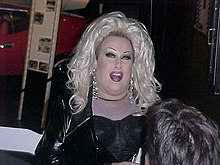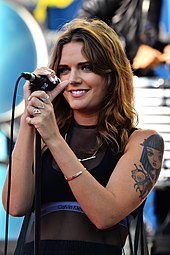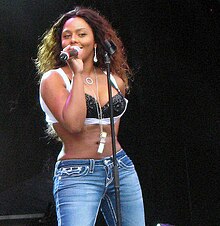Madonna and sexuality
[12] That perception was stronger in the 1990s; Mark Bego reflected "since her arrival on the scene ten years ago, Madonna has become so synonymous with sex (and publicity) that it may be hard to remember that she started as a musical phenomenon.
[18] Author Adam Sexton called some press pieces as a "creepy moralism" decrying that "reading articles about Madonna, you could get the idea that it was the habit of pop journalists to marry the first person they slept with".
[20] They wrote that certain segments of our culture find comfort in identifying her as a carrier of the AIDS virus—a disease perceived by some as a punishment for immoral behavior— and making Madonna HIV-positive establishes her moral guilt and provides for her ultimate containment by death.
[24] Her notoriety, was commented on by Chuck Klosterman in Sex, Drugs, and Cocoa Puffs (2004): "Whenever I hear intellectuals talk about sexual icons of the present day, the name mentioned most is Madonna".
[27] Madonna had promoted safe sex awareness in the 1980s and 1990s during the AIDS crisis as a means of inhibiting the spread of the virus, and continued to do the same in the next years, as reported Jason Mattera.
[33] Madonna donated a percentage of "Papa Don't Preach" (1986) profits to programs advocating sexual responsibility,[34] although it was Planned Parenthood of New York that initially requested it.
[43] Aware of other precursors, by 2002, Australian professor Jeff Lewis commented "more than any other single female figure, [she] has self-consciously 'explored' and displayed women's sexuality".
[47] On the other hand, Donald C. Miller, in Coming of Age in Popular Culture (2018), described that she consistently intertwined sexuality with religion, feeling it was something that set her apart from earlier female performers.
[11] Different reviewers and academics in popular culture, further emphasized this stage of her career, with Gauntlett arguing that her sexual assertiveness "has been one of the most distinctive elements of her life and work".
[54] In 100 Entertainers Who Changed America (2013), Robert Sickels believes that in her 1980s-works, Madonna portrayed herself as the "modern woman": Comfortable in and gratified by her own sexuality, but still a powerful female.
In early 1990s, Pennsylvania State University's Lisa Henderson elaborated that it became one of the reasons why some segments of society hate the singer, for challenging the sexual status quo.
[63] Media scholars Charlotte Brunsdon and Lynn Spigel, explained that she "inverted" or at least "challenged", America's notions of sex, gender and power exploring taboos.
[72] English musicologist Sheila Whiteley observed a substantial portion of positive reactions, citing that she was viewed by others as "acting responsibly" in bringing sex to the fore, so forcing the media, schools and parents alike to confront the "inconsistencies inherent" in the public attitude towards female sexuality.
[78] She further polarized views by using an open sexuality while aging, most notoriously when she entered into her 40s with a response by audience with commentaries like "desperate", "cringey" and "give it up", according to Grazia magazine.
[80] Writing for PinkNews in 2023, Marcus Wratten noted commentaries from British tabloid The Daily Mail, saying her "aggressive sexuality" is now "threatening to compromise" her "uncompromisable legacy".
On the point, he compared male artists such as Elvis Presley and Mick Jagger explaining they were called "sex gods" due their sexual display and appeal.
[84] In Madonnaland (2016), Alina Simone wrote that the sexual double standard becomes clear, when compare Madonna to "famously libidinous" artists like Jim Morrison or Jagger.
[90] Constantine Chatzipapatheodoridis, a Greek adjunct lecturer at University of Patras, wrote that "Madonna responses vary when openly provokes the public with overt sexuality".
[91] Madonna addressed criticism of "setting women back 30 years" in a 1984 interview with MTV, saying "I don't think that I'm using sex to sell myself, I think that I'm a very sexual persona and that comes through in my performing, and if that's what gets people to buy my records, then that's fine.
In 2006, Ottawa Citizen's Dunlevy T'cha, said that "many critics" seen her "variously", including embodying the "contradictions of a society fascinated by fame, ambivalent about sexuality, hostile toward women".
[94] In 2004, Shmuley Boteach criticized her by saying that for more than two decades, she has been allowed to "destroy" the female recording industry by erasing the line that separates music from pornography.
[117] Feminist scholars Cheris Kramarae and Dale Spender explained "Madonna may have preached control, but she created an illusion of sexual availability that many female pop artists felt compelled to emulate".
[119] Some industry fellows like Joni Mitchell blasted Madonna, as Joe Taysom from Far Out says, before her, "it wasn't a particularly popular route of expressions for female musicians at the time".
And by making overt sexuality part of her act, she even paved the way for hip-hop artists like Lil' Kim, who made waves by going nearly topless to the MTV awards.
A number of academics and other commentators, discussed Madonna's influence on other performers, with professor Arthur Asa Berger recognizing her usage of sexuality has been imitated by other females.
[123] Ambiguity and contradictory perspectives: Treva B. Lindsey, a professor of Ohio State University writing for NBC News in 2022, doesn't give "too much" credit to Madonna, but to Blues singers of the mid-20th century, whom says them influenced more in popular culture and on others while mentioning the cases of female rappers such as Lil' Kim, Mary J. Blige or Missy Elliott among many others.
[134] By this time, authors of Future Texts (2012), also explained that some millennial pop divas such as Britney Spears or Lady Gaga, used it without "any of the subversive elements that made Madonna's work the subject of feminist inquiry".
Named the "Madonna Condoms", it featured the singer's face on the boxes and internal package, taken from her nude photos shoot by Martin Schreiber in 1979 whom sold them the license.
[151] In 2020, Men's Health included Madonna in their "100 Hottest Sex Symbols of All Time", with staff declaring: She "has captured the world's heads, hearts, and hormones with startling consistency".
[160] Writing for Harlan Daily Enterprise in 2003, Diana West also remarked her popularity and influence on other "pop descendants", saying the sexualization of childhood became "pretty irreversible" after Madonna, although it didn't start with her.












